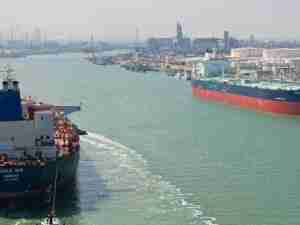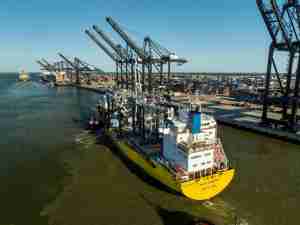The ports of Long Beach and Los Angeles recognized six companies with Clean Air Action Plan Air Quality Awards for exemplary efforts to reduce air pollution from their local maritime and goods-movement operations.
“We’re delighted to honor these companies for taking the time and effort to successfully reduce their environmental impacts through leadership and quick action. The companies operating at the two ports are working hard to be good neighbors by taking extra steps to improve air quality in the Harbor Area and Southern California,” said Port of Long Beach Executive Director J. Christopher Lytle. “These truly are industry leaders.”
“We continue to see significant year-over-year pollution reductions at the port complex, thanks in large part to our industry partners,” said Port of Los Angeles Executive Director Geraldine Knatz, Ph.D. “Beyond the commitment and investments made by the companies being honored in this year’s Air Quality awards, we applaud their efforts to innovate and take their operations to higher standards of efficiency and sustainability.”
Now in their fifth year, the annual Air Quality Awards began shortly after the Ports of Los Angeles and Long Beach approved the landmark San Pedro Bay Ports Clean Air Action Plan in 2006.
Port tenants and other organizations that serve the ports are eligible to be nominated. The judging panel includes port staff, as well as representatives from the South Coast Air Quality Management District, California Air Resources Board and the U.S. Environmental Protection Agency.
This year’s awardees fall into two categories:
Air Quality Leadership at the Corporate Level
• SA Recycling LLC: SA Recycling, which has a scrap-metal exporting facility in each port, has demonstrated a strong commitment to reducing air pollution beyond local and federal requirements and to shrinking its carbon footprint. The company has retrofitted or replaced about 80 percent of its local equipment in order to reduce harmful pollutants. SA Recycling was the first company in the scrap metal industry to add a Regenerative Thermal Oxidizer and chemical scrubber to its metal-shredding operation to control volatile organic compounds and hazardous air pollutants. The company has also added low-NOx burner technology and dust collectors, and enclosed its shredder and other material handling and sorting areas. Additionally, SA Recycling is testing two all-electric yard trucks in partnership with the Port of Los Angeles and Balqon Corporation.
• APL: APL, an international shipping line, has a companywide environmental policy which sets objectives and targets for reducing the company’s environmental impact. APL voluntarily uses low-sulfur fuel across the world and has been an industry leader in using shore power to cut its at-berth emissions. APL plans to spend nearly $4 billion over the next two years building and deploying some of the world’s more energy-efficient ships. It also is testing an innovative seawater scrubber device on one of its existing ships as part of the ports’ Technology Advancement Program. APL holds regular environmental training for its employees, including the “Go Green” initiative that empowers employees to develop processes to save energy and natural resources, promote recycling, and use green office products.
• Harley Marine Services: Harley Marine, which operates tugboats in San Pedro Bay, has committed to a companywide internationally certified environmental management standard. The company replaced the engines in three San Pedro Bay-based tugboats with the cleanest available models, and one of these tugs soon will be recertified to an even cleaner Tier 3 engine standard. These upgrades will reduce the company’s NOx emissions by 150 tons through 2012. Also, Harley Marine built and patented a Vapor Recovery Unit to remove hydrocarbons from tank barges during petroleum loading operations, resulting in up to a 98 percent reduction of volatile organic compounds. In 2011, Harley Marine










